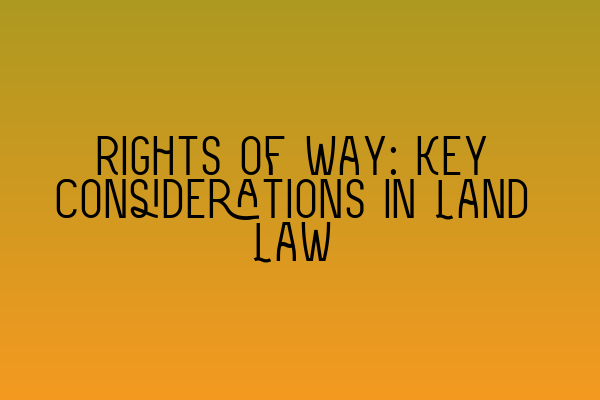Rights of Way: Key Considerations in Land Law
When it comes to land law, rights of way are a crucial aspect that property owners and legal professionals must understand. A right of way grants an individual or entity the legal right to pass through another person’s property. It allows access to a particular destination, such as a public road, without necessarily owning the land.
In this blog post, we will delve into the key considerations surrounding rights of way in land law. Understanding these considerations is essential for property owners, developers, and legal practitioners alike. So, let’s explore this topic in detail.
Types of Rights of Way
Rights of way can be classified into two primary types: express and implied. An express right of way is explicitly mentioned in legal documentation, such as a deed, contract, or lease. It is the most straightforward and easily enforceable form of a right of way.
On the other hand, an implied right of way is not explicitly stated in any legal document but is inferred based on the circumstances surrounding the property. Implied rights of way often arise due to historical usage or necessity. For example, if there is only one feasible route to access a property, an implied right of way may be established.
Establishing a Right of Way
To establish a right of way, several elements must be considered and proven:
1. Necessity: In some cases, a right of way can be established based on the necessity of access to a property. If there is no other reasonable way to access a property except through another person’s land, a right of way may be implied.
2. Historic Usage: A right of way can also be established through historic usage. If a certain path or route has been consistently and openly used for a significant period, it may give rise to an implied right of way.
3. Express Grant: An express right of way is the clearest and most straightforward method of establishing a right of way. It requires a legal document, such as a deed, that specifically grants the right of way to the individual or entity.
4. Prescription: In some cases, a right of way can be acquired through prescription. This means that if someone has openly and continuously used a particular route for a statutorily prescribed period (usually 20 years), they may acquire a legal right to continue using it.
Importance of Consulting a Property Solicitor
Given the complexity and potential legal implications of rights of way, it is crucial to consult a property solicitor when dealing with matters related to land and property. A solicitor with expertise in property law can provide valuable guidance and advice regarding rights of way, ensuring that your interests are protected.
A property solicitor can assist with various aspects of rights of way, including:
1. Investigating Title: It is important to conduct a thorough investigation of the property’s title to uncover any existing rights of way. This will help determine whether any restrictions or obligations are in place.
2. Drafting Legal Documents: Whether you are granting or receiving a right of way, a property solicitor can assist in drafting the necessary legal documents, such as deeds or contracts, to ensure the rights and obligations are clearly defined.
3. Resolving Disputes: Disputes regarding rights of way can arise, especially when multiple parties are involved. A property solicitor can help resolve these disputes through negotiation, mediation, or, if necessary, litigation.
4. Due Diligence: When buying or selling a property, it is crucial to conduct proper due diligence to identify any potential issues with rights of way. A property solicitor can assist in this process, ensuring that there are no hidden complications that may impact the property’s value or intended use.
In conclusion, rights of way are a vital aspect of land law that property owners and legal professionals must understand. Whether it’s an express or implied right of way, establishing and navigating these rights can be complex. Consulting a property solicitor with expertise in land law is crucial for ensuring that your rights and obligations are protected.
At SQE Property Law & Land Law, our team of experienced solicitors can provide expert advice and assistance with all matters related to rights of way. Contact us today to schedule a consultation and learn more about how we can help you navigate the intricacies of land law.
Related Articles:
– SQE 1 Practice Exam Questions
– SQE 1 Practice Mocks FLK1 FLK2
– SQE 2 Preparation Courses
– SQE 1 Preparation Courses
– SRA SQE Exam Dates
